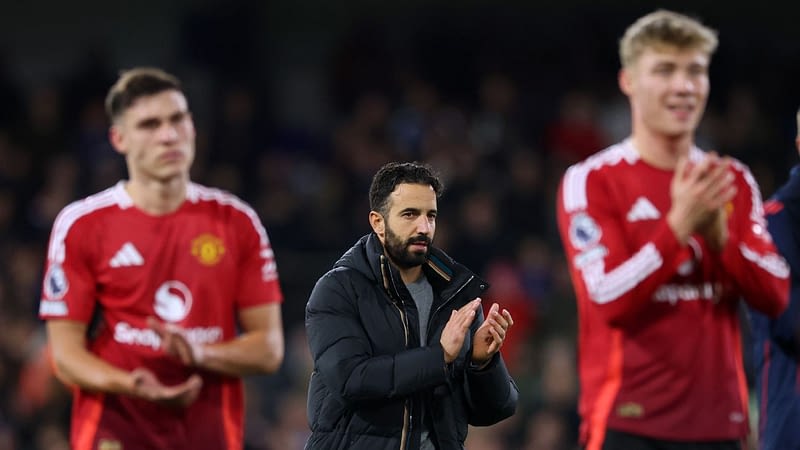Rúben Amorim’s Manchester United Era Begins with a Tough Draw Against Ipswich Town
Rúben Amorim’s highly anticipated debut as Manchester United’s head coach didn’t exactly go as planned. A 1-1 draw against Ipswich Town at Portman Road left fans with mixed emotions, and Amorim himself was quick to warn that the road ahead will be anything but smooth. “We are going to suffer for a long period,” the Portuguese manager admitted, signaling that patience will be key as he implements his vision for the club.
It all started with a bang—literally. Marcus Rashford gave United a dream start, scoring just 81 seconds into the match. For a moment, it seemed like the Red Devils were on their way to a statement win under their new boss. But Ipswich, led by former United assistant Kieran McKenna, had other plans. Omari Hutchinson’s equalizer ensured the home side walked away with a point, and if not for two crucial saves by André Onana, Ipswich might have stolen all three points.
Amorim’s Tactical Overhaul: A Work in Progress
Amorim, who previously found success with Sporting CP, wasted no time introducing his signature 3-4-2-1 formation. However, with less than a week to work with his new squad, the tactical shift seemed to leave players overthinking their roles on the pitch. “It’s hard for the players in three days to cope with everything,” Amorim explained. “We are changing so much in this moment with a lot of games.”
Despite the challenges, Amorim remains steadfast in his approach. He emphasized that sticking to his principles now—even if it means short-term struggles—will pay dividends in the long run. “Next year in the same stage, we will be here with the same problems or we start now, we risk a little bit, we suffer a little bit, and in the next year we will be better at this point,” he said.
Players Adjusting to New Demands
One of the most significant changes under Amorim is the shift in player responsibilities. He highlighted how full-back Diogo Dalot, for instance, is being asked to adapt to a more structured role. “Dalot used to pass the ball to center backs, go inside, play as a midfielder. Now he has to stick to this position,” Amorim noted. These adjustments, while necessary, are taking time to sink in. “The [players] are thinking too much because we are changing too much with two trainings now without space to improve in training,” he added.
Amorim also pointed out that the team’s lack of fluidity is a natural part of the process. “When we want to listen to a lot of you guys that Manchester United doesn’t have a structure, we will have a situation [for] you [to] see a structure,” he said. “But it’s not fluid. This is like steps. We have to put in the heads, the structure. When they start thinking about the structure, they will play so much better.”
Balancing Matches and Training
With a packed schedule that includes Premier League, Europa League, and Carabao Cup fixtures, Amorim faces the daunting task of balancing competitive matches with much-needed training sessions. He revealed that some players will be rotated out of games to focus on mastering his tactical philosophy. “We have to find a way,” he said. “The only way to do it is we have games and the guys that don’t play have trainings. Everybody is going to play, everybody is going to be on the bench, so they have the feeling of the game, but they need to train.”
Amorim’s plan involves using the team’s depth to ensure both development and results. “With this schedule, we need to rotate the team so we will try to use that to train, to improve the team, and to win matches,” he explained. “Without the time, we have to find the time.”
What’s Next for Manchester United?
United fans will need to buckle up for what promises to be a rollercoaster ride under Amorim. The manager’s candid admission that the team will “suffer for a long period” is a sobering reminder that rebuilding a footballing giant is no easy task. However, his commitment to his principles and his belief in the players’ willingness to adapt offer a glimmer of hope.
As the Red Devils prepare for their upcoming fixtures, all eyes will be on how quickly Amorim’s methods begin to take hold. Will the team’s growing pains lead to long-term gain? Only time will tell, but one thing is certain: the Amorim era at Manchester United is officially underway, and it’s going to be a fascinating journey.
- Key Takeaway: Amorim’s tactical overhaul will take time, and fans should brace for a challenging transition period.
- Player to Watch: André Onana, whose crucial saves against Ipswich kept United in the game.
- Next Steps: Rotating the squad to balance training and matches while implementing Amorim’s vision.
For now, patience is the name of the game at Old Trafford. The question is: how much patience will the fans and the club’s hierarchy have?
Originally Written by: Mark Ogden





















